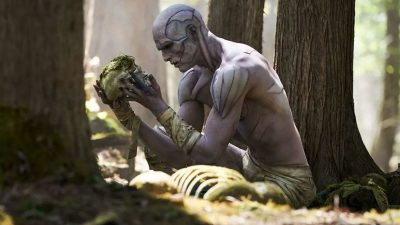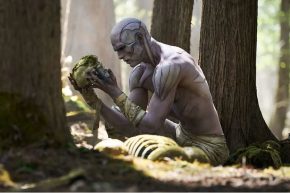Luchino Visconti’s 1960 epic, Rocco and His Brothers, is a mesmerizing tapestry of family, ambition, and social upheaval, set against the backdrop of a bustling industrial city of Milan. This grand cinematic canvas—often hailed as one of Visconti’s masterpieces— is an exploration of class struggle, personal sacrifice, and the often harsh realities of (urban) life.
Following the death of their father, the Parondi family, led by their determined mother Rosaria (played with striking depth and fiery intensity by Katina Paxinou), arrives in Milan with hopes of a better future where their dreams are soon to be challenged.

Source: Film at Lincoln Center
The film opens with the family arriving at Milan’s imposing Centrale Railway Station, carrying nothing but a few bags and oranges wrapped in a scarf (very Southern, very “Land of the Olives”). Their arrival at night, with no one waiting for them at the hallowing station – not even their elder brother Vincenzo who they came to rely on, – highlights their naivety and the nature of reality they are set to face.
The arriving family’s naivety is both touching and worrisome. As they navigate the city on a tram at night, clutching a small piece of paper with an address, their vulnerability is palpable. Little mouse running across a busy marketplace. Initially, Vincenzo’s fiancée, Ginetta (played by Claudia Cardinale), and her family extend a warm welcome. However, tensions quickly surface when Rosaria and Ginetta’s mother clash over Vincenzo’s responsibilities. The dispute centers on whether Vincenzo should prioritize supporting his family or focusing on his new marriage.
Soon, Vincenzo and the Parondi family find themselves out on the streets. They eventually locate a basement apartment in the shabby suburbs of Milan, – knowing they soon will be evicted – far from the city’s more glamorous areas. Their displacement and poverty are starkly portrayed through the gritty streets and cramped, tapestry peeled off of the walls living conditions.
The narrative focuses on the four Parondi brothers, each representing different responses to their challenging circumstances: Vincenzo, portrayed by Spyros Fokas, has already been in Milan for a while, so he is mildly disillusioned. He has taken up boxing and quit too, by realizing “you box for two thousand liras for ten years and your face gets constantly smashed”. He is realistic and knows well how difficult it is to find a good job and earn a living in the big city. Due to the fact that he is engaged, and struggles to be fully independent, ready to have his own family he becomes a semi-outsider to the Parondis’daily matters. Fokas, by the way, was originally discovered by Visconti himself and brought from Greece to Italy.
Rocco (Alain Delon) stands out as the idealistic, self-sacrificing brother who finds happiness in the little things. His dedication and desire to please everyone around him, even at his own expense, present a strong case for examining the consequences of extreme selflessness. The dangers of people-pleasing are huge indeed. As Ciro at one point says “Rocco’s a saint, but what can he do in this world? He won’t defend himself. He’s so forgiving. But one mustn’t always forgive.”
In stark contrast is Simone (Renato Salvatori), Rocco’s brother who epitomizes the darker side of ambition. Renato Salvatori (who unfortunately died at a young age) gives a standout performance, Simone is the embodiment of ambition at any cost. His relentless pursuit of a comfortable life leads him to committing pretty much every form of crime from stealing to raping, constantly crossing moral and legal boundaries. He feels inferior even when he is winning match after match as a boxer, and is extremely jealous of the potent, beloved and talented Rocco. From the moment Cerri, his coach, tells him “Good morals are the first requisite for an athlete. That means that women, cigarettes, drinking, and many other things are taboo.” we know this will not be a long-lasting career for the „shaky-ground” Simone.
Ciro (portrayed by Max Cartier who eventually became a popular singer) is a teenager at the time the Parondi family arrives in Milan. He dedicates all his spare time to studying and works diligently as a delivery boy for a local department store. He has great integrity and inner wisdom from the get-go. Luca (Rocco Vidolazzi), the youngest sibling, symbolizes hope for the future. His observation of the family’s struggles and his role as a passive witness highlight the impact of their experiences and our responsibility when it comes to showing a good example for the younger generation.
The Parondi family dynamics are further complicated by the appearance of Nadia (Annie Girardot), a beguiling prostitute from the 5th floor. Simone immediately falls for her, while she is not only frequently in bed with other men, but soon becomes smitten by Rocco. She is a whirlwind of sensuality and chaos, and it is soon revealed that dark personal experiences put her on this disastrous path.
Rocco and His Brothers is one of Visconti’s grand-scale family dramas, marking a significant point in his career alongside works like The Leopard and The Damned. Despite its grand narrative scope, the film retains elements of Visconti’s early, neorealist approach, focusing on social intricacies and real-life characters. This blend of grand melodrama with social realism is exemplified by the film’s examination of the Parondi family’s adaptation to their new life and shifting perspectives.

Source: Filmaffinity
The film centers on a number of themes, touching on faith in others and in good, the pursuit of a better future, and the role of family. It explores issues of integrity, self-destruction, and the impact of past actions on the present. The struggles of the working class, the search for social mobility, and the challenges of life in a big city are also central to the narrative.
Visconti’s use of black-and-white cinematography by Giuseppe Rotunno (All That Jazz) is jawdroppingly beautiful. It greatly supports the film’s emotional depth. Notable scenes include the iconic “kissing scene” captured with a high-angle camera turn, the master shot of the brothers fighting in the street at night, and the boxing scenes. The hyper-close-ups of the brothers debating Simone’s future and their actions, and the moment when Morini emerges from his shadow in the hallway, are also beyond memorable.
The film’s score by Nino Rota (9 ½) is hauntingly beautiful, which sometimes amplifies the plot’s emotional weight and sometimes gives viewers some breathing or laughing space. Reportedly, Francis Ford Coppola was in such awe of the music, he went onto hiring Rota for The Godfather (1972).
The film faced much controversy upon its release, two of its violent scenes had to be significantly shortened for American audiences. Despite these edits, one of those scenes led to the film being banned in Milan due to concerns about its portrayal of the city.
Despite its nearly three-hour length, Rocco and His Brothers is a compelling and thought-provoking watch. It is rich in narrative, in complex characters and relatable social situations. The film’s exploration of themes such as faith, integrity, and social class struggles resonate as much today as it did upon its release. The contrast between Rocco’s saintly demeanor and Simone’s ruthless ambition and downfall provides a microcosm of the broader societal tensions, offering viewers a reflection on human nature and the consequence of grand social inequality. And I could not help but wonder whether that shot from the Parondi basement’s window to the snowy ground had something to do with the almost identical shot in Bong Joon-ho’s Parasite (2019).
Rocco and His Brothers is now available for rent on Apple TV.
~ by Dora Endre ~

























Comments